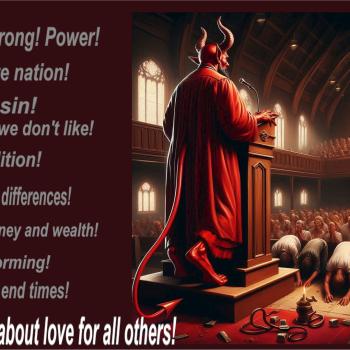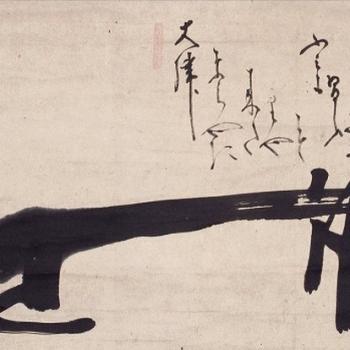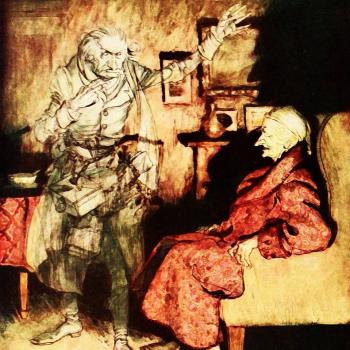Storytelling is a way of imparting important cultural and religious concepts, especially to children. One of my favorite stories is one where the child is involved through questions and repetitive phrases, and teaches children the basics of not disturbing other creatures. My daughter loved to announce the last line of this story, which sounds more lyrical in its original Telugu: wouldn't the teeny tiny ant bite you if you stick your finger in its teeny tiny ant hole?
Hindu religious texts add to the wealth of stories about animals and how to treat them. Patanjali's famous Yoga Sutras assert that ahimsa (non-cruelty) is a critical precept to attain enlightenment; the Bhagavata Purana states that "Deer, camel, donkey, monkey, rats, creeping animals, birds and flies—one should consider them like one's own children, and not differentiate between one's children and these creatures"; and in the Mahabharata, we are exhorted to take only what we need and not exhaust nature's resources.
But far more "in your face" relationships to animals for Hindus lie in our perception of God or the Divine. We have all seen and read about the "Monkey God" or the Elephant [-headed] God, Hanuman and Ganesha, respectively. One prominent scholar of Hinduism, Arvind Sharma, has coined the term "monotheistic anthropomorphic polymorphism" to try to convey the Hindu belief that there is ultimately one God (as in Abrahamic monotheism), but that God appears to us in many forms (and is thus polymorphic). And this polymorphism stretches to anthropomorphic gods. And Hindus are not alone in ascribing human characteristics to animals.
Dr. Jeffrey Masson, Sanskrit scholar, follower of Advaita Vedanta, and author of Dogs Never Lie About Love, explains that British naturalist Charles Darwin was severely criticized for anthropomorphizing animal behavior, and cites Darwin's story of a monkey who bravely stood up to a fierce baboon to save a human. "Bravery and courage are not words scientists are eager to see applied to a monkey by the founder of evolutionary theory," from Masson's When Elephants Weep. Masson attributes his inspiration to have compassion for animals to the influence of Hinduism in his life and thinks that ahimsa is one of the greatest concepts of all time.
Ahimsa is also the underlying principle for many Hindus' vegetarianism; as the late Satguru Sivaya Subramuniyaswami said, "Vegetarianism is a natural and obvious way to live with a minimum of hurt to other beings. . . . The opposite of causing injury to others is compassion and love for all beings." Hindus make up the largest percentage of vegetarians in the world today, but not all Hindus are required to be vegetarian. Some do consider it a core principle—particularly gurus, swamis, and spiritual leaders—since there is a karmic impact to killing and eating an animal. The ancient Tamil text, the Tirukural, puts it thusly: "How can he practice true compassion who eats the flesh of an animal to fatten his own flesh?"
A fellow Executive Council member of Hindu American Foundation, Sachi Lamb feels strongly about how animals are treated and took the lead in preparing this document for the Humane Society on Hinduism and the Ethical Treatment of Animals. Like Sachi, I too am often confused by the contradictions surrounding animals today: loving one's pet, and eating meat; being an activist for mistreated dogs and cats, yet, as she asks, "what about all the mistreated cows, pigs, and chickens that suffer in the meat industry?" States including Iowa, Minnesota, and Florida are now enacting laws to prevent the videotaping of the cruelty as occurred at E6 Cattle Company in Texas. The laws are not to prevent the cruelty itself; so I ask, like Mark Bittman of the NY Times, who protects the animals?
And the answer is found by returning to the Hindu principle of karma, where each creature has a spark of the divine and goes through cycles of birth, death, and rebirth. The atman, the divine spark or soul, is everlasting and does not die with the physical body. Instead, the atman continues its journey, carrying forward unfulfilled karmic outcomes from previous lives, and takes on new physical life forms until it attains moksha, or spiritual perfection that provides freedom from the cycle of reincarnation. All life, from the smallest plant to the largest animal, must go through this process, and these laws of karma affect the human animal, the domesticated animal, and the slaughtered one.
6/22/2011 4:00:00 AM





